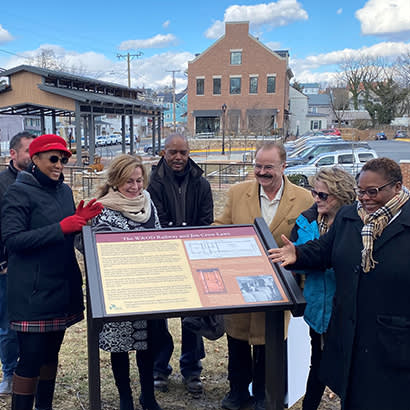
For an enhanced digital experience, read this story in the ezine.
“Belonging” is the end result of diversity, equity and inclusion. If people can see something of themselves in a place or program, they will feel a sense of belonging. As with most issues, it is helpful to focus on the end result and then work back from there to be effective.
Most, if not all, park and recreation agencies have been thinking about issues of diversity, equity and inclusion in new ways over the past few years. Parks and recreation is at the core of every community, and we want our places and programs to be relevant to all the people we serve.
With land comes history, and one way to make parkland engaging is to tell a more complete and inclusive history. Telling this inclusive history helps everyone see the many people and groups who have walked these lands before us and put current events into a fresh perspective.
This past February, Northern Virginia Regional Park Authority (NOVA Parks) hosted four Black history events in three counties. Each of these events was done in partnership with the local county chapters of the National Association for the Advancement of Colored People (NAACP). The Board of Supervisors chair for each county was involved in the events, as well as many other local elected officials.
Three of the events were along the Washington and Old Dominion (W&OD) Trail, a 45-mile trail that was one of the first rails-to-trails in the country. Three identical interpretive signs were unveiled in each of the three counties the trail goes through: Arlington, Fairfax and Loudoun. The signs tell the story of segregation laws that affected the passenger rail service in the first half of the 20th century. “These signs recognize/acknowledge a painful part of our past, a time when laws were created to treat Blacks unequally,” says Karen Campblin, NAACP Fairfax County Chapter president. “Although Jim Crow laws have been overturned, it’s important to remember what Black Americans have endured and to make sure that we are all treated with dignity and respect in the future.”
While diversity, equity and inclusion are a focus of many organizations, there also is an effort by some to push back against things like diversity training and Black history education. We live in a time when these issues are regularly in the headlines. At all four events in Northern Virginia, there were some who expressed appreciation that there was an effort to highlight local Black history in a way that would stand for decades to come. Pastor Michelle Thomas, NAACP Loudoun County Chapter president, spoke of the power of the partnership between NOVA Parks and the NAACP.
While the first three events were along the W&OD, the most popular trail in Virginia, the final event was the dedication of a recently discovered and researched graveyard that is believed to be a site where enslaved people were buried. This site had become part of the forest over the years, but several indentations in the ground were indications of its use more than 150 years ago. With ground-penetrating radar and the search through old records, NOVA Parks was able to shed light on the history of this site, which sits on a bluff overlooking a river.
“NOVA Parks was created for and is dedicated to serving our many and diverse Northern Virginia communities,” says Cate Magennis Wyatt, NOVA Parks’ chair. “Our mission, in addition to creating places for recreation, is to ensure our shared historic places are conserved and our stories memorialized, even if those stories hold up a mirror to some of our worst moments.”
Programs and interpretive efforts are some of the fastest and most impactful ways to effect change in park and recreation diversity. During the summer of 2021, The Carlyle House, which is an 18th century mansion/museum run by NOVA Parks, hosted a Juneteenth celebration focusing on the arts. When a site that was built and run by enslaved people hosts a celebration focused on Black artists, the perception of that place changes. In Northern Virginia, many groups, including Korean, Bolivian, Pakistani, Persian, Indian and LGBTQ+, all have festivals and events on NOVA Parks lands. The open discussion of history embodied in the four new markers and the programming of space in a way that promotes inclusion both lead to a sense of belonging.
Parks can and do bring people together. They are public lands that belong to everybody. Part of our challenge in running parks is to do what we can, so that everyone in our area feels the parks are open, welcoming and relevant to them.
Paul Gilbert is Executive Director of Northern Virginia Regional Park Authority.

